Do We Ever Learn from History?
“History always has just one more card up its sleeve.”
Ruth
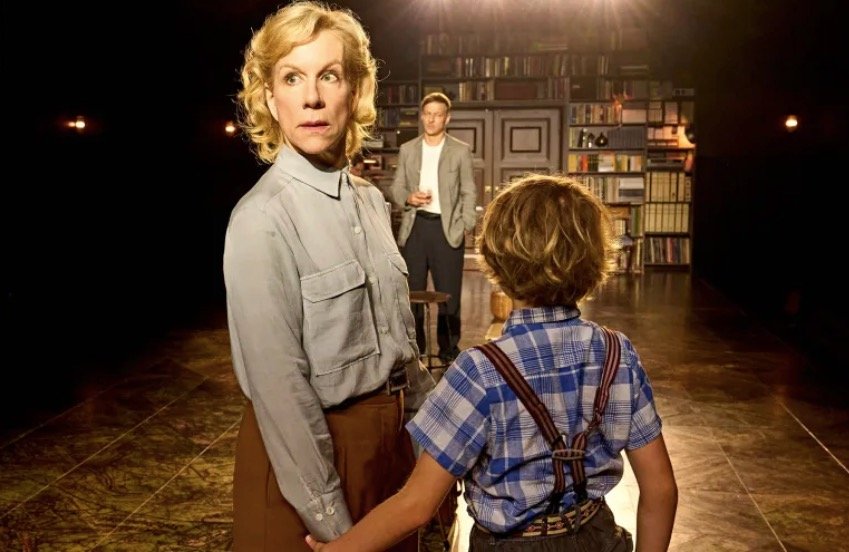
We can always rely on David Lan to direct, adapt or write drama with a strong base in humanity. In The Land of the Living he looks at the monstrous Lebensborn Eugenics Programme which Himmler fronted, to encourage the births of those who were regarded as Aryan and racially superior. This started because the German birth rate was falling, and later, during the Second World War, Nazi concerns that many of the most genetically Aryan were dying. The translation of The Land of the Living is das Land der Lebenden.
Initially Lebensborn was about supporting unmarried Aryan women not to abort their babies by providing them with accommodation, in privacy and mostly arranging adoptive families. Later with the desire to ensure Aryan population growth, children from Eastern Europe were kidnapped and taken to Germany where they could be brought up in German families. One of the scenes in this play discovers a surgeon and his instruments used to measure Polish children’s features for a scale determining whether they filled the physical criteria of being adequately Aryan. Early on we see a mother has made her child wear glasses, although he has perfect eyesight, to prevent him being selected.
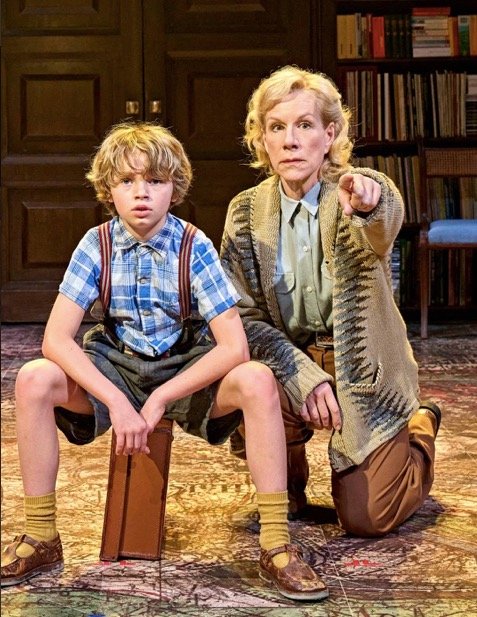
1990 sees a disturbed young man Thomas (Tom Wlaschiha) call on Ruth to remonstrate with her for her actions 45 years earlier. In 1945, Ruth (Juliet Stevenson) in her 20s is working for the United Nations Relief and Rehabilitation Administration. When supporting children after the Second World War, UNRRA discover that children have been kidnapped from Eastern Europe and determine to try to re-unite them with their families. The play is already wrestling with the moral dilemma of whether to leave a child where he has made his home, with the language he speaks, or return him to his birth family. As a child who was, not forcibly, happily adopted, I should not like to have been returned to my birth family.
We meet Young Thomas (the remarkable nine year old Darcy Tosun) showing anger at being separated from his German mother who has brought him up. Ruth would like to unite him with his birth family but it takes a long time to discover where his origins might be and then it is only that he understands Polish but not where in Poland he has lived. Thomas’s journey faces a three way fork at this point: To stay in Germany, to go to Poland or another route, to go elsewhere. Crucially Thomas will not be making that decision.
Stephen Daldry directs with his usual ability to expertly convey many different scenarios. We remember how he handled Billy Elliot. Miriam Buether has reconfigured the Dorfman into a long traverse playing area, a kitchen and an armchair at one end, a library and piano at the other. Under the stage are filing cabinets with hundreds of paper files on view. The older Thomas watches the scenes from a distance. On Sound, Gareth Fry gives us the commotion of children playing, mostly happy chatter with some occasionally crying.
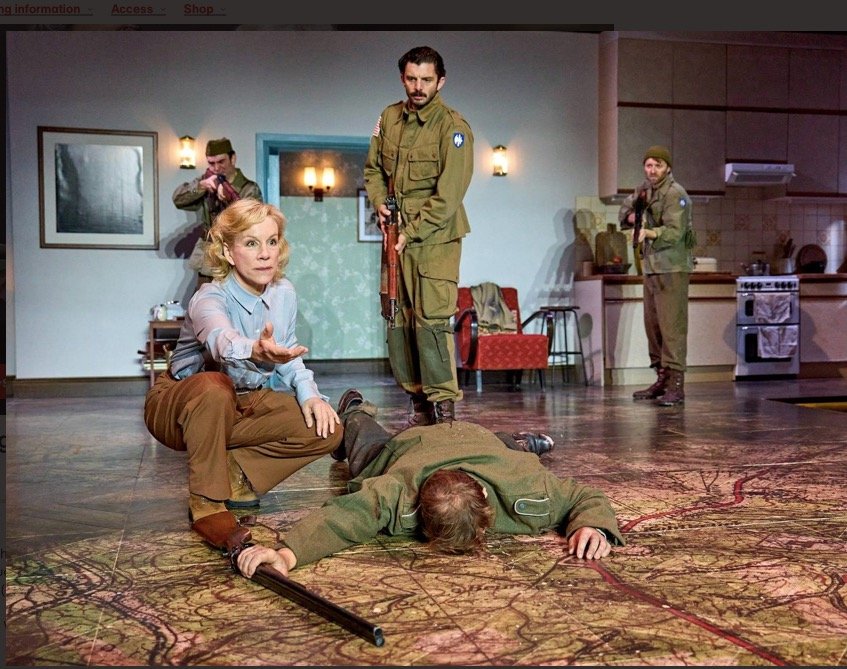
There are scenes with American and Russian military and Kate Duchêne as Dora works with Ruth and UNRRA defending the children. A train to the border is expedited after, in American territory, the Russians demand to take the Polish children, with all the cast on benches and the cacophony of rail travel with smoke and squealing brakes. We meet the anxiously waiting Polish families. A band plays Polish music and we are excited for them. As Ruth re-unites a child with what remains of her Polish family, she holds a child’s frock and the acting is so superb that we feel the little girl is really there.
The direction and performances are flawless with Juliet Stevenson never off stage and always perfectly believable as Ruth, someone trying to do their best. When Thomas almost six decades later is reunited with his remaining Polish family after a chance encounter, he will deliver his verdict on what happened to him.
The relevance today of Ukranian children being kidnapped and taken to Russia is well illustrated here. I was reflecting on how many people would be using DNA to definitely discover their origins and how many surprises there might be. This play powerfully shows how we do not learn from history.
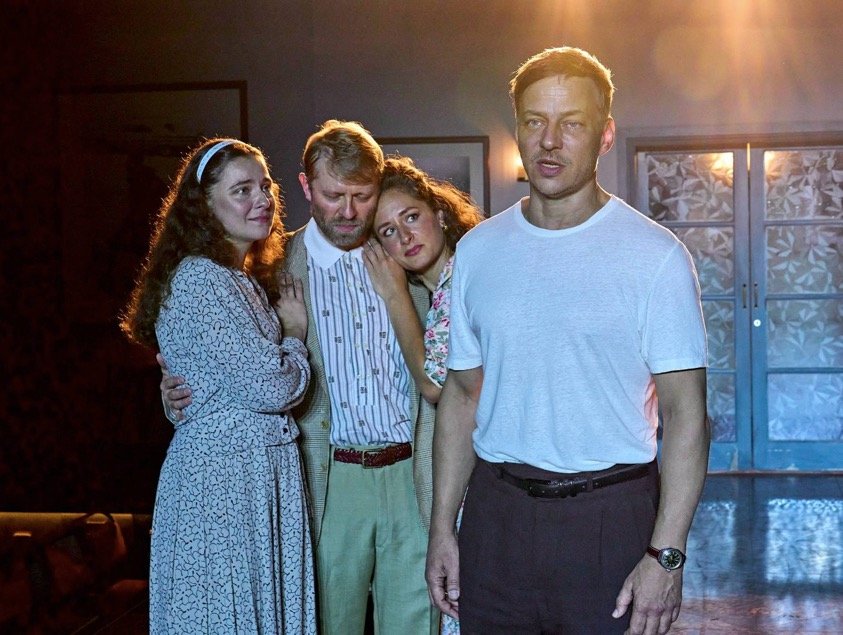
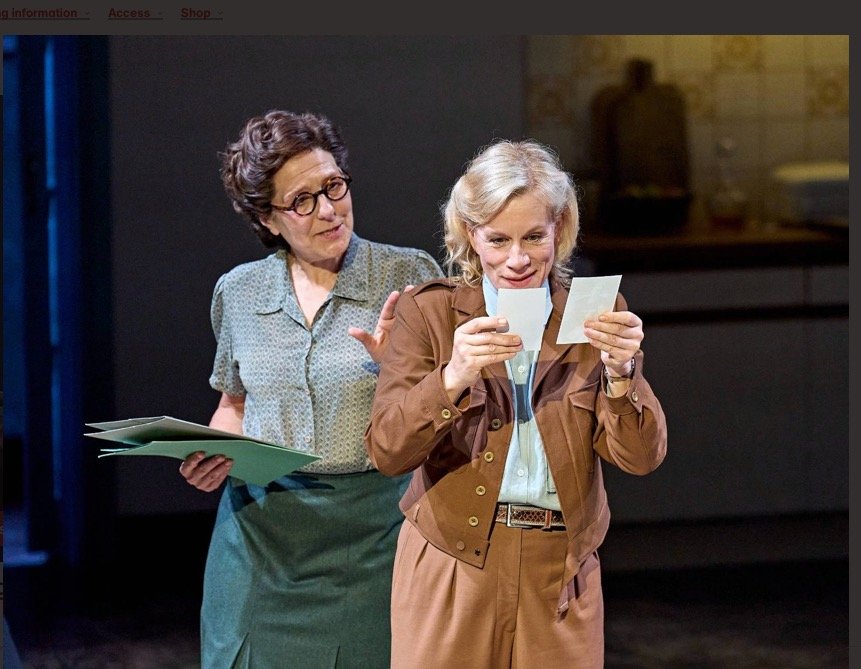
Production Notes
The Land of the Living
Written by David Lan
Directed by Stephen Daldry
Cast
Starring:
Juliet Stevenson
Atilla Akinci
Avital Lvova
Caroline Loncq
Cosima Shaw
Kate Duchêne
Michael Fox
Michael Marcu
Anastasia Martin
Hubert Hanowicz
Marek Oravec
Sasha Syzonenko
Tom Wlaschiha
Creatives
Director: Stephen Daldry
Set Designer: Miriam Buether
Costume Designer: Nikky Gillibrand
Movement Director: Paul McGill
Lighting Designer: James Farncombe
Fight and Intimacy Director: Maisie Carter
Composer: Paul Englishby
Sound Director: Gareth Fry
Information
Running Time: Two hours 55 minutes including one interval
Booking to 1st November 2025
Theatre:
Dorfman Theatre
National Theatre
Upper Ground
South Bank
London SE1 9PX
Rail/Tube : Waterloo
Telephone: 020 7452 3000
Website: nationaltheatre.org.uk
Reviewed by Lizzie Loveridge
at the Dorfman
on 19th September 2025

